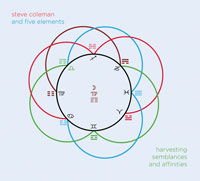Fringe Recent Recordings Guide
A Sampling of Good New Jazz and Other Music

GUITAR SUMMIT: Bill Frisell Trio, Beautiful Dreamers (Savoy Jazz). My vote for the year’s most moving cover song goes to the reluctant American guitar hero Bill Frisell’s perplexing, sweet take on “Keep on the Sunny Side,” both celebrating and yearning for said sunny side. Frisell’s latest group is a bass-less trio (a format he has mastered in the venerable Paul Motian Trio with saxist Joe Lovano), in collusion with a familiar ally, versatile violist Eyvind Kang (all hail the mighty viola), and a new/old drummer, Rudy Royston, whom Frisell used to play with when living in Denver as a young sprout. Now, Royston is a New Yorker and is making some joyful, subtle noise, especially alongside Frisell.

Frisell’s new, aptly named Beautiful Dreamers, his first for the Savoy label after many years on Nonesuch, is yet another must-check-out wonder in Frisell’s almost ridiculously fine discography. Its 16 tracks veer from re-thoughtful covers (from Benny Goodman to “Goin’ Out of My Head”) and more tasty Frisell originals, suggesting the influence of Buster Keaton and Edward Hopper (and Winslow Homer, paid tribute to on a new tune) as much as specifically musical models.
Locally, excitement is building about this trio’s arrival at the Lobero on Saturday, February 12, in an enticing doubleheader with John Scofield’s trio. This will make Frisell’s third appearance in that complementary room (including a quartet with Santa Barbara-based bassist David Piltch and a duet concert with drummer Joey Baron). Hmm, there’s another Xmas gift idea: tix to a modern-jazz guitar summit meeting.
OTHER MUSIC: David Sylvian, Sleepwalkers (samidhisound). Speaking of beautiful dreamers, David Sylvian is one of music’s greatest dreamworld crooners, having lurked and circulated on the ambient rock and experimentalist scenes for decades. A fine primer in Sylvian’s impressive if under-the-radar activities is this compellingly cool—and yes, dreamy—remix compilation from the singer’s work over the past decade. Here, we get a cohesive collection of pieces from the intriguing albums for his samidhisound label, as well as work with old comrade Ryuichi Sakamoto and a fruitful new alliance with the Norwegian mood-masters Arve Henriksen and Jan Bang with the track “Thermal” from Henriksen’s ECM album Cartography. But on songs like “Sleepwalker,” “World Citizen,” the string quartet-lined “Five Lines,” and “The World of Everything,” Sylvian’s understated, hypnotic eloquence places him in a cultural continuum somewhere between Robert Palmer and Robert Schumann.

Tom Zé, Estudando a Bossa (Luaka Bop). An incurably wily, whimsical, experimental, melodic, and genre-twisting musician, the great and underrated Tom Zé (born 1936) has always been something of a delicious rebel. He has been languishing off to the left-er end of the already left-minded Brazilian Tropicalia movement. Estudando a Bossa is a thing of slightly bent beauty, a more lyrical example of the Zé magic, but with plenty of the quirks of songcraft and sonic texturizing and organic recontextualizing we expect of him—placing him in the company of God-kissed oddballs like Esquivel and Serge Gainsbourg. Needless to say, you’ve never heard bossa nova like this.
This taste treat just been released in the States this year on David Byrne’s Luaka Bop label (Byrne has been a Zé advocate for many years, rescuing him from undeserved obscurity starting in 1990), and no Brazilian record collection is complete without it. For further adventures in Zé-land, for the generous of wallet or obsession, check out the new five-disc box set Studies of Tom Zé: Explaining Things So I Can Confuse You.

Steve Coleman and Five Elements, Harvesting Semblances and Affinities (Pi). For pure, cerebrally energizing, and muscularly titillating math jazz, few artists have seized the day with greater power and long-lasting influence over the past quarter century than Steve Coleman. Starting with the M-Base scene in Brooklyn 25 years ago and up through his first new album in nine years, Coleman dares to engage our brains, while giving off that special inspired intensity related to jazz strains from Charlie Parker to John Coltrane and beyond and before.



